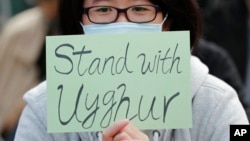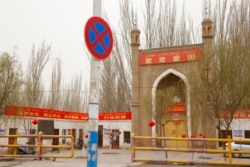Tahir Hamut Izgil, a 52-year-old Uyghur asylum-seeker, has been living in the United States with his wife and three children since 2017. The family settled in northern Virginia after fleeing China's Xinjiang Uyghur Autonomous Region.
Izgil has been waiting four years and has not yet been granted asylum by the United States Citizenship and Immigration Services (USCIS).
"My two daughters' China-issued passports expired in 2019, and they have no official status here in the U.S.," Izgil told VOA. "Without any status, my daughter who is now a freshman at Virginia Tech is not able to apply for a student loan or scholarship."
According to Izgil, he and his family came to the U.S. when China began "arbitrarily detaining Uyghurs under the pretext of countering extremism or separatism" and confiscating the passports of Uyghurs.
"There are in total, a few hundred Uyghur asylees like me in the U.S. anxiously waiting for their asylum interviews by the USCIS, some even for six or seven years," Izgil told VOA.
Uyghurs in U.S.
According to Victoria Palmer, USCIS spokesperson, the agency reviews applications for asylum and determines eligibility on a case-by-case basis.
"Uyghur asylum-seekers are lawfully allowed to remain in the United States while their case is pending," Palmer told VOA. "Additionally, the USCIS Asylum Division may consider an urgent request to schedule an interview outside of the application priority order on an individual basis."
Citing Beijing's "systematic attempt to destroy" Uyghurs, including the imprisonment of more than 1 million people, the U.S. denounced Beijing's treatment of Uyghurs in Xinjiang as crimes against humanity this year.
Beijing has repeatedly dismissed allegations from Western countries and human rights groups that facilities are internment camps, instead insisting they are "vocational training centers" where Uyghurs learn new skills.
Last month on behalf of Uyghur asylum-seekers in the U.S. and Uyghur refugees around the world, Izgil testified at a hearing of the Congressional Executive Commission on China.
"Uyghurs who have been able to go abroad still have great difficulty in achieving secure living conditions," Izgil told VOA after the hearing.
Even though he feels abandoned by U.S. authorities who have not yet ruled on his asylum case, he says in comparison with Uyghur refugees in other parts of the world, his family is lucky.
"There are thousands of Uyghur refugees around the world who may be returned to China where they will face life-threatening situation if deported," Izgil said. "For example, Thailand is holding more than 50 Uyghur refugees in its prison for more than five years."
Uyghurs in Turkey
Five thousand miles away from northern Virginia, in Istanbul, lives Ihsan Kartal, who is too afraid to use his own name. Kartal is a 35-year-old Uyghur refugee from Xinjiang.
He is one of an estimated 50,000 Uyghur refugees living in Turkey.
Kartal said he arrived in Turkey with his wife and three children in February 2018 from Dubai after police in the United Arab Emirates (UAE) interrogated him and warned him of the possibility of being deported to China.
"I had been working and living in Dubai since 2010," Kartal told VOA. "But everything changed in 2017 and 2018 there. I witnessed some of my Uyghur friends in UAE being detained by UAE authorities and deported back to China."
UAE is among countries such as Egypt and Saudi Arabia that have deported Uyghurs to China in recent years, CNN reported.
In Turkey, according to Kartal, he and his fellow Uyghur refugees live in constant fear of being arrested by Turkish authorities and returned to China.
Turkish president Recep Tayyip Erdogan signed an extradition treaty with China in 2017.
"These days, we always see and hear that some of our fellow Uyghur refugees (are) being arrested at midnight from their residence by Turkish security force," Kartal told VOA.
Kartal's Chinese passport expired in 2019. Even though the Turkish government issued him a "long-term residence permit," he still struggles to put food on the table.
"This permit doesn't give me the right to work or operate business legally in Turkey," Kartal told VOA in a phone interview. "I can't leave this place with (an) expired passport. I am stateless. I can't even become a refugee in another country."
Kartal said that his only hope now is to go to a country like the U.S. where he can "at least feel safe and not (be) fearful" of being deported back to China.
"Many of us here wish to be in a country like the U.S. or Canada where we can live and work safely without any fear of being harassed by local authorities," Kartal said.
Kartal said the U.S. is doing little to protect vulnerable Uyghurs like him.
"The U.S. is calling what we face in China a genocide, but not doing anything to help Uyghur refugees like us around the world," Kartal said. "They say big words but even a small, good deed of helping the vulnerable like us is not in their agenda."
In fiscal year 2021, the U.S. admitted no Uyghur refugees through its refugee admission program, the conservative news outlet The Dispatch reported last month.
According to a State Department spokesperson, Uyghurs outside of China currently are eligible to access the U.S. Refugee Admissions Program (USRAP) through UNHCR Priority 1 referrals or referral from a U.S. embassy.
"The United States remains focused on the protection of Uyghurs worldwide," the spokesperson told VOA.
The majority of refugees gain access to USRAP through Priority 1 UNHCR referrals, according to the spokesperson.
"We continue to closely coordinate with UNHCR to ensure it is able to refer vulnerable Uyghurs to the USRAP for resettlement consideration without delay, and to determine if there are other steps needed to ensure humanitarian access to resettlement for Uyghurs in need," the spokesperson said.







